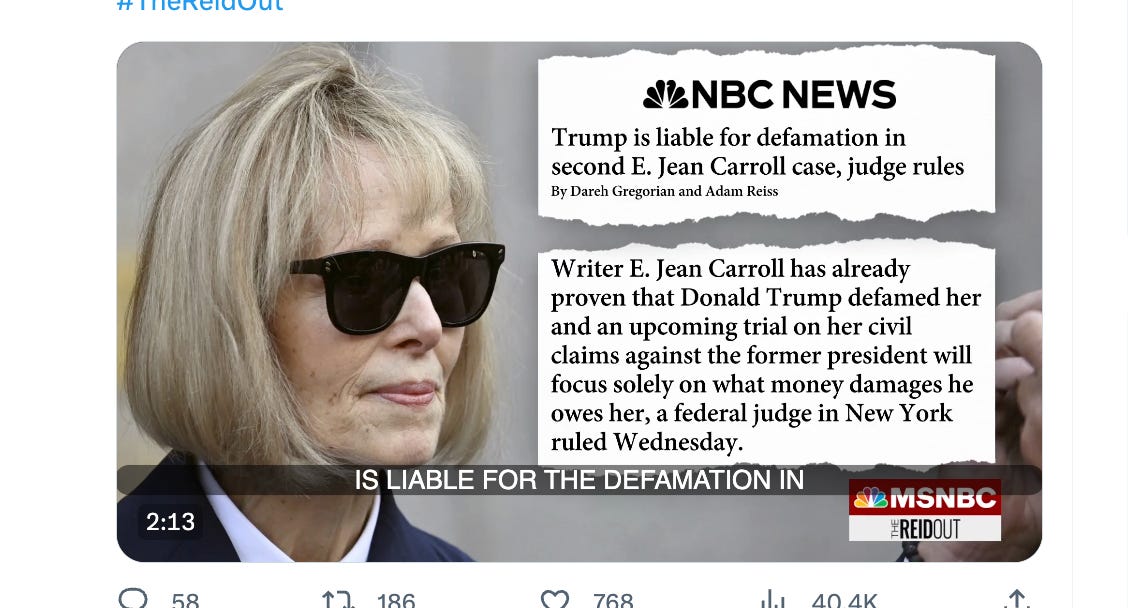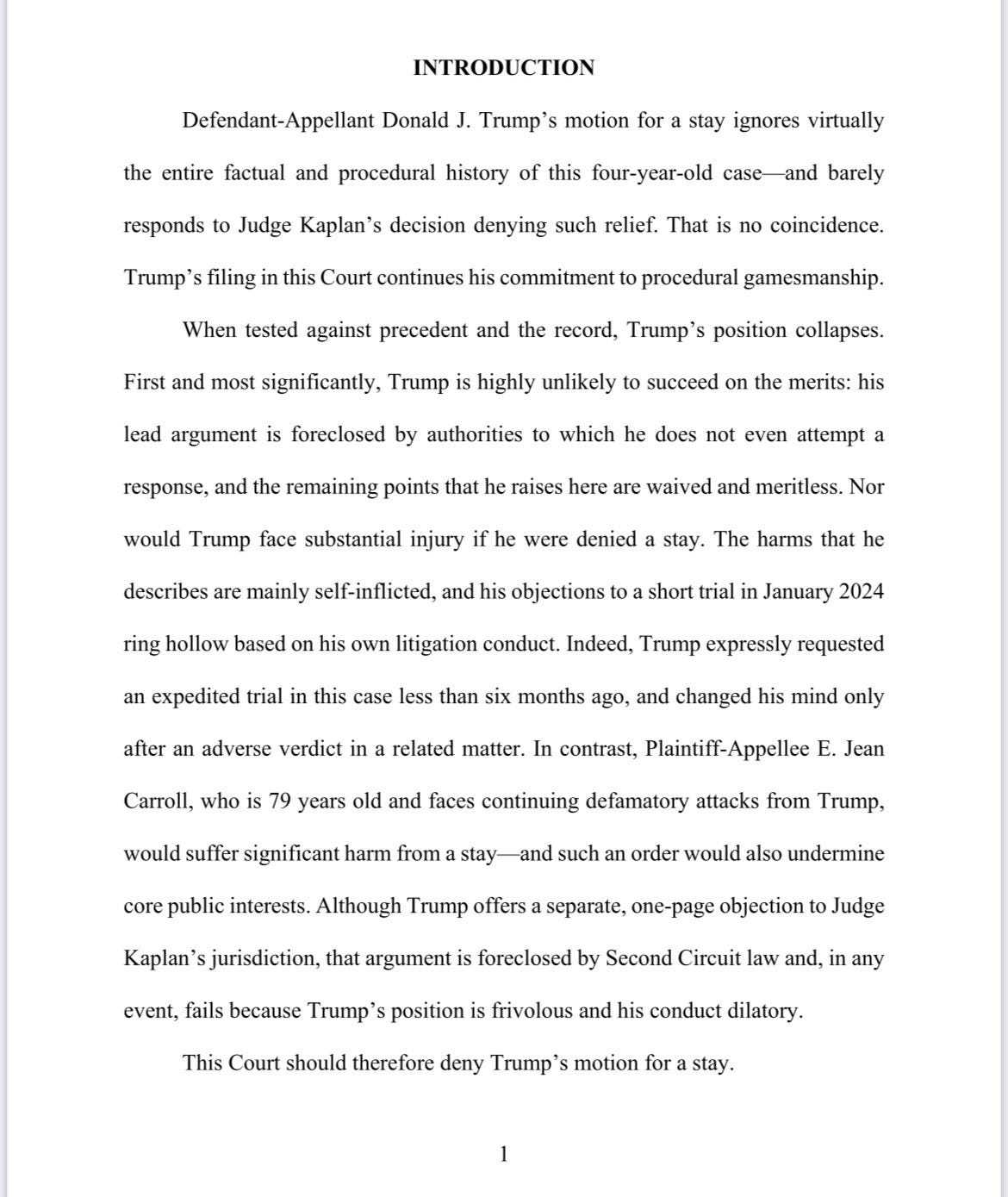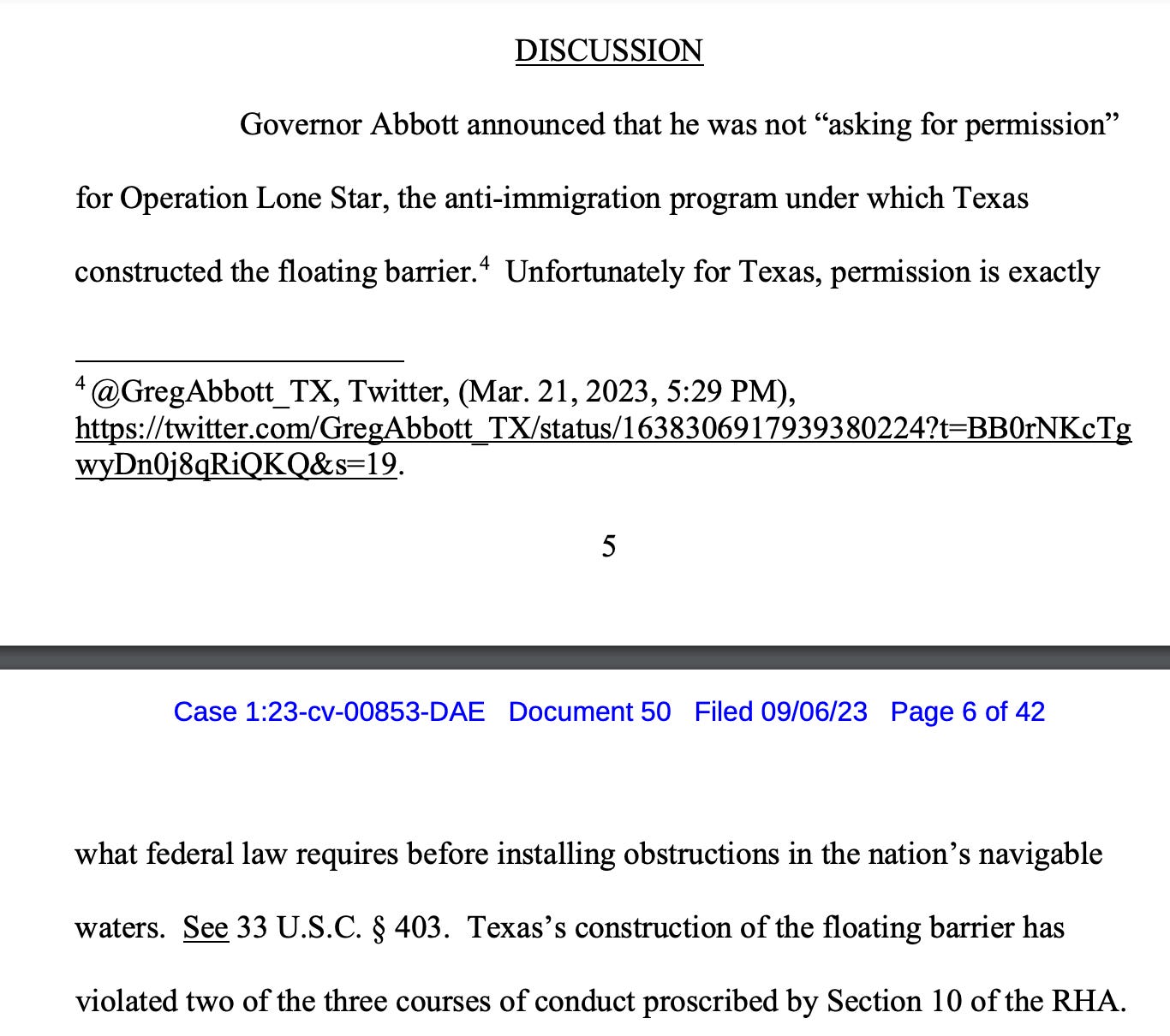It was quite a day. We’ve noticed this before, that there are a lot of legal issues and rulings on a lot of different fronts, all coming to a head simultaneously. Many, but not all of them, involve Trump. Tonight, rather than looking at each situation in detail, we’ll try to extract the most important or interesting things we learned from each one.
It’s hard to imagine how Trump continues to function under the pressure of…all the losing. But Trump went on conservative radio host Hugh Hewitt’s show and, full of bluster, insisted he would testify at his trials. "Oh yes, absolutely,” Trump said. “That I look forward to."
Sure. Just like he testified at the first E. Jean Carroll defamation trial. But as we all know, lying to the public, even when you’re running for the presidency, isn’t a crime. That’s good news for Trump, because he’s got plenty on his hands as is, starting tonight with E. Jean Carroll.
Carroll already beat Trump, to the tune of $5 million dollars, in a defamation trial earlier this year. The trial involved the second of the two civil defamation cases she brought against him. The jury found Trump defamed Carroll with comments he made after he left the presidency and also that she was entitled to recover damages from him under a new New York statute for adult survivors of sexual assault.
But after winning that case, the first case Carroll filed was still pending. That lawsuit alleged Trump defamed her during a press gaggle while he was the president by claiming she lied when she said Trump had raped her in a department store dressing room. He also disparaged her looks, saying she wasn’t his type. That case was delayed by Trump’s efforts to have DOJ represent him because, he claimed, he was a federal employee just doing his job when he made his ugly, untrue comments about Carroll.
It took DOJ a while to get that one right, but recently, they decided Trump’s defamation of Carroll was not within the scope of his official duties, clearing the way for the federal district judge assigned to the case to set it for trial. He did, and trial is now scheduled for next January.
Today’s news is that the Judge granted a partial summary judgment, which means that the first jury’s decision that Trump defamed Carroll is binding in the January trial. The only issue left to decide is damages—how much more money Trump will have to pay Carroll. Her lawyer can ask for punitive damages, sufficient to punish Trump and to prevent a repeat of what he did after the last trial—making additional defamatory comments the day after the verdict. That could be a very high number.
Trump wanted the amount of damages he will have to pay to be offset by Carroll’s previous award of damages against him. The Judge told him no dice. You can read the Judge’s full order here.
Trump had also asked the Judge to stay the January trial, pending his appeal on “absolute presidential immunity.” The Judge denied his request as frivolous and told Trump no more delays. The Judge cited Trump's “advanced age” as justification for moving forward, noting the age of both parties and concluding that further delays might prevent Carroll from ever receiving compensation she is entitled to.
The best part of today’s action was an early morning filing from Carroll’s lawyer, Roberta Kaplan, opposing Trump’s request to stay the trial. Kaplan doesn’t pull any punches in her sharp but witty pleadings. Like the Judge, she’s out of patience with Trump, but in an entirely professional way, calling out his “commitment to procedural gamesmanship” and noting Trump previously requested an “expedited trial” before losing the first case. Consistency is a virtue in court. Trump lacks it.
Today’s severance hearing in Georgia went about like we expected. Kenneth Chesebro and Sidney Powell will get their speedy trials, but they will get them together, not separately. The other 17 defendants are still waiting on a trial setting, but it sounds like there’s a good chance they will be set for trial together.
Prosecutors explained that each trial will involve proving the overarching RICO conspiracy, not just the limited number of overt acts in furtherance of the conspiracy that the defendants in each trial setting were involved in. That’s how RICO works. Each defendant is charged with the RICO conspiracy, not simply with the overt acts they participated in personally, and the government must prove that charge against each defendant, no matter how the various defendants are grouped for trial. There are no shorter or longer trials depending on which defendants are included. They are all the same.
In other words, unless the Judge just wants to try the case repeatedly, which Fani Willis’ office estimated at four months, not including jury selection or the defendants’ cases, he needs to limit the number of trials. That’s what the law authorizes him to do and what he seemed poised to do today.
The arguments from the defense counsel were not particularly compelling. Surprisingly, they conceded that their defenses weren’t “antagonistic”—that there was no risk they would conflict because Chesebro and Powell didn’t know each other. So, they traded off their one good argument for severance, the possibility of antagonistic defenses, against the loser of an argument that they didn’t know each other. The best they could muster was that the Judge could sever the cases if he chose to. He did not, because the defendants failed to offer any arguments that would have merited it under Georgia law.
The defendants who invoked Georgia’s speedy trial act must be tried in October. But the remaining 17 can all be set for a second trial together at a later date, unless one or more of them come up with a better argument for severance than what we heard today. Prosecutors continued to insist all 19 should be tried together in October, but Judge McAfee told prosecutors that it would be "unrealistic" to have all of the cases ready for trial that quickly. He was correct to do that—forcing defendants to trial so quickly would set up any convictions for reversal on grounds that due process rights were violated. Looks like the former prosecutor, whether experienced or not, is a solid, steady jurist. The case is sure to test him as it would any judge, but he was well prepared and ruled from the bench with a firm hand today. As my former colleague from the U.S. Attorney’s Office in Savannah, Georgia, Amy Lee Copeland, said on MSNBC Wednesday night, the Judge has ice water running in his veins.
Early in the hearing, one of Chesebro’s lawyers made a comment that was likely far more telling than he intended. He said something to the effect that before 2020, it was just that people voted and “somehow it all worked out.” He made his comments in the context of arguing that the case against his client wasn’t substantial, that it was just about "intellectuals," and that before this case, no one really thought about the Electoral College Act. What a great way of encapsulating where the country was before Trump—we all just assumed that people voted and it worked out. No more, and that’s thanks in no small part to the role his client and his co-defendants played in the 2020 election.
In the Mar-a-Lago case, reporting today confirmed that Jack Smith has a cooperating witness on the inside. It seemed likely from earlier reporting and the contents of the superseding indictment that Yuscil Taveras, the IT guy at Mar-a-Lago, had decided to flip and testify against Trump after receiving advice from a lawyer in the public defender’s office, in place of the lawyer that one of Trump’s PACs was reportedly funding for him. That deal was confirmed today.
That’s one deal done. The interesting question is what Trump co-defendants Waltine Nauta and Carlos de Oliveira do now. Will they really go to prison for Trump? The government has already asked Judge Aileen Cannon to schedule “Garcia” hearings for the two, in which they’d be advised of their lawyer’s conflict of interest in representing them and asked on the record whether they were willing to proceed with the lawyer regardless. But Cannon’s conduct of the case before her has been markedly different than other judges, including the Washington, D.C. judge who determined that Taveras should consult with independent counsel. In fact, it was she who, when the government requested the Garcia hearing suggested that the defendants should object to the government’s use of a grand jury in Washington, D.C. to conduct investigation, a step that was entirely proper despite the Judge’s implication to the contrary.
Also today in the Mar-a-Lago case, news from ABC, which obtained transcripts of Trump lawyer Evan Corcoran’s recordings about his interactions with Trump. Corcoran advised Trump that if he didn’t comply with the government’s subpoena, they could get a search warrant for Mar-a-Lago. ABC reported, “Evan Corcoran, warned the former president in person, at Mar-a-Lago, that not only did Trump have to fully comply with the subpoena, but that the FBI might search the estate if he didn't, according to Corcoran's audio notes following the conversation.”
In other words, Trump knew that a search was likely in the works when he set Nauta and De Oliveira to the task of removing boxes from storage in Mar-a-Lago, and subsequently returning fewer of them than were removed. The inference is that Trump knowingly removed items he did not want prosecutors to find. That’s a stunning development and advance in what we know about Jack Smith’s evidence against Trump on the obstruction charge.
So much for Trump’s outraged protestations the day of the search that it happened without warning. That day, Trump said, “after working and cooperating with the relevant Government agencies, this unannounced raid on my home was not necessary or appropriate.” He claimed that it was an effort to interfere with his bid to return to the White House, saying, “such an assault could only take place in broken, Third-World Countries.” That attempt at outrage looks different now that we know the facts—that the government bent over backwards to give Trump the opportunity to return classified documents he kept; that he didn’t do so, even removing some once he learned a search was possible. Prosecutors can argue to jurors that the evidence shows that Trump deliberately secreted items out of view of his lawyers and also of DOJ, anticipating the search. The evidence against Trump could get even worse for Trump if his remaining co-defendants flip.
The Special Counsel in the Hunter Biden cases says he will seek an indictment from the grand jury on gun-related charges by end of the month. It’s unusual for prosecutors to publicly discuss grand jury proceedings. That is happening here because the Judge asked the government for an update on the status of the case, in view of the upcoming expiration of the time permitted for prosecutors to proceed under the federal Speedy Trial Act.
Prosecutors have limited time after they charged Hunter Biden using an “information” rather than an indictment, even though the guilty plea that was supposed to resolve those charges fell apart. Prosecutors’ time to proceed to trial will expire at the end of the month, but they advised the judge that will not pose a problem because they intend to seek an indictment before they are out of time.
Counting procedures under the Speedy Trial Act are arcane at the best of times, and this case is in a particularly confusing posture. If you want to puzzle out the precise time calculation for yourself, Special Counsel for the Hunter Biden matter David Weiss’s filing is here.
An interesting question—what if the grand jury declines to indict, requesting additional investigative work or witnesses before they are prepared to vote? Prosecutors could likely go to the Judge with a motion to exclude the time it takes to comply with any requests from the time that counts towards the expiration of the Speedy Trial Act clock, but these are the sorts of complicated issues that carry a risk on appeal if there is a conviction. Prosecutors usually like to avoid them. Hunter Biden’s lawyer, Abbe Lowell, suggested on MSNBC this evening that it would make sense for prosecutors to restore the deal they originally offered Biden and conclude plea negotiations. The clock is ticking.
Peter Navarro’s trial is all but over. The prosecution has presented all of its evidence and rested. The defense told the court it won’t be calling any witnesses. It seems almost certain Navarro will be convicted, because it’s a simple case. Congress sent Navarro a subpoena for testimony and documents and he refused to comply. The only real question is how quickly the jury will return a guilty verdict after closing arguments tomorrow.
We end tonight on a positive note. Remember the horrible spinning buoys Texas placed in the Rio Grande in an effort to prevent migrants from crossing the river, leading to horrible accidents? DOJ filed a lawsuit, arguing that the placement of the barriers violated federal law that bars obstruction of navigable waterways.
Today, a federal judge enjoined the state and Governor Greg Abbott from constructing new blockades and ordered them to remove existing ones by September 15. The Court expressly noted that despite Governor Abbott’s bravado and his claim that he wasn’t “asking for permission” to block migrants, federal law required him to do so.
Yes, the Governor will appeal the matter to the ridiculously conservative 5th Circuit Court of Appeals. But protecting the waters of the United States is an important matter, and even if the 5th Circuit doesn’t see the case that way, it’s extremely likely DOJ will prevail before the Supreme Court. The basis for the ruling may not have anything to do with protecting migrants, but anything that prevents exhausted people from being injured or slipping underneath the buoys—there is reporting of two related deaths and Mexico has lodged official protests—is important progress. This is an important case for DOJ and one to keep an eye on.
All of that, and it’s only Wednesday.
We’re in this together,
Joyce







"What a great way of encapsulating where the country was before Trump—we all just assumed that people voted and it worked out. No more, and that’s thanks in no small part to the role his client and his co-defendants played in the 2020 election."
We really do need to thank Trump for waking us up from our slumber before it was too late, and for educating us that policy differences create opponents, not enemies - that as long as both opponents believe in the underlying truths and foundation of a democratic constitutional republic, all is well. The enemies are those like Trump and the MAGAts, who don't believe.
Kudos to the judge who ruled against Governor Abbott.